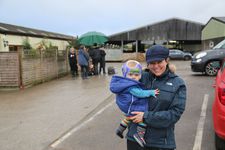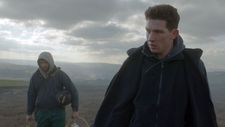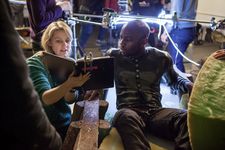Over the years, the Edinburgh International Film Festival has become about a lot more than just watching moviews. Its industry events receive a lot of attention and one particularly important one this year was All Inclusive, which brought together deaf and disabled filmmakers to discuss the challenges they face in this industry and look at ways they might be resolved, as well as to celebrate work produced despite them. One of the organisers was Rachel Robey, Disability Arts Champion at the British council. We caught up with her and with two of the event's speakers, Charlie Swinbourne and Aurora Fearnley, to find out more about it.
 |
| Rachel Robey and her daughter on the set of The Levelling |
This was the first event of its kind for Rachel, a producer whose work includes The Levelling and A Man's Story. "The British Council has a really close relationship with the Edinburgh International Film Festival," she explains, and she sees the event as an example that can encourage festivals more generally to make an effort to include disabled people.
"We really wanted to do something that we felt would give people the same sort of information that everyone else just takes for granted," she says. "We made it as inclusive as possible. We had BSL translation and we had about 30 people with different needs. It was really positive and lovely because it gave us the chance to showcase work by disabled filmmakers. It never does any harm to encourage more people into filmmaking and get what's already out there seen by more people."
In preparing for the event, she says, she did a lot of research, talking to deaf and disabled filmmakers, and found quite a knowledge gap when it came to the opportunities available. "People whose work was really strong hadn't taken advantage of opportunities to showcase their work at festivals." Often this was because they were simply unable to access industry events where they could network and learn how to do that.
There were also cost issues when it came to pursuing opportunities, something that the British Council is now trying to tackle through changes to its Short Film Travel Grants. "We are able to make grants to filmmakers to present their short films at a preselected list of festivals, if the work has been invited to screen. Deaf and disabled filmmakers can apply for additional financial support for travel, if for instance if they have to travel with an extra person because they need an interpreter or an access worker. We can never fully fund the trip but we hope that we can make a difference between someone being able to afford to go – or not."
Although she's now working on a similar event to be held in London - one that she hopes will benefit from her increased knowledge - what she really wants is for all industry events to be more inclusive so that special ones become unnecessary. "We're in the vey early stages," she says, "but we're not the only ones working on this. The work that the GFT are doing in Glasgow is inspirational, it's fantastic."
The GFT's recent renovations mean all parts of its listed building are now wheelchair accessible, it has induction loops available for deaf cinemagoers, and it has been praised for its highly popular autism-friendly screenings.
Explaining her passion for working in this area, Rachel says "There are lots of interesting, talented people out there with great stories to tell. We can't just let economics be the sole reason things are where they are."
 |
| Charlie Swinbourne directing |
Charlie Swinbourne, the writer and director behind shorts The Kiss and Four Deaf Yorkshiremen Go To Blackpool in 2014, and creator of comedy sketch show Deaf Funny, joined the panel at the invitation of the British Council. "I've been making deaf films and TV programmes for ten years now and it's something I'm very passionate about," he says. "But there are barriers to deaf and disabled people taking a full part in festivals so it's important to highlight that and discuss the solutions."
Sometimes problems like that extend to the filmmaking process.
"I have experienced barriers in terms of people on set not really understanding the differences between making a programme with deaf contributors and making one with non-deaf contributors. That can cause tension unfortunately," he says. "Other barriers are with communication, not communicating clearly or feeling left out while with the crew, which isn't ideal! I also feel that deaf TV programmes are undervalued, with people not fully recognising their merits, partly because they don't understand deaf culture."
So are these barriers primarily about impairments, or about society's failure to make reasonable adjustments?
"Ultimately disabilities can't be changed, but our environment can be," he says. "There's no use thinking someone can't do something because they are deaf or have a disability, when adjustments can be made so that they can be. I believe in the social model, it's the only way forward."
Are the film industry and cinema audiences are missing out because of the shortage of deaf and disabled people succeeding in filmmaking?
"Yes absolutely. Cinema should be about telling everyone's story, and some stories aren't being told because deaf and disabled people aren't in the position to tell them. We have a lot to say, if we get the chance to say it!"
Aurora Fearnley is an actress whose work has included Confession and Avengers: Age Of Ultron. She has also worked as an editor and has directed a number of short films.
"I became involved with the Edinburgh event because the film that I made was financed by 104 Films and they're a production company that focuses specifically on disabled-led talent or disabled-led narratives," she says. "They've been doing that for a while. The money they had wasn't really for making films, it was really for training for people with disabilities, but they used it to make films as well, as part of the training. There is no specific funding for people with disabilities in any of the public areas, as far as I can see. The BFI has a three tick policy but that's not the same as funding specifically for a voice that's under-represented.
"I showcased my film in Edinburgh along with ten other short films that 104 Flms had produced. Some were by very new talents and others were by more established talents. I was really pleased to go because I felt that it was good to start having a conversation about inclusivity and disability separately to the word diversity. I think there is a real tendency for somebody to say something's diverse when 50% of the population are women and in a way the gender thing always comes first. I think disability inclusivity is really the last thing that gets discussed. It's still a hard topic to talk about for a lot of people."
This is, she feels, partly because there are so many different ways to be disabled that people don't know where to start. Lack of education about the issues leaves people feeling uncetain and if they're worried about offending or upsetting disabled people, they may simply avoid trying to include them.
 |
| Aurora Fearnley working with David Gyasi on Pulsar |
"It used to be that in the beginning we had gay cinema and then lesbians were included and then it became gay, lesbian, transgender, queer, and I think the complexities of disability are the same. It's an umbrella term, it's so complex and broad that that conversation isn't happening."
Aurora felt that the Edinburgh event was a really good first step but didn't provide much in the way of clear solutions or pathways for disabled filmmakers. "It was still takking mostly from the perspective of people who didn't have disabilities and were making films, and I think that's the disconnect. There's already such a challenge involved, often, in everyday life for some people with disabilities, before the extra step of being a filmmaker, and they're not really taking that into consideration. Those two things need to come together, from my point of view."
Starting these conversations also means that disabled filmmakers need to feel secure enough to speak up, she says.
"This is really the first year that I've been publicly saying anything about disability. I think the previous ten years I was pretty terrified that someone might find out. My disability is invisible. I'm always compensating but I'm used to doing it and I have habitual routines and I know what I can and can't do, so I won't push myself. I'm still ambitious. So this year, because I didn't see anybody with disabilities or with conditions or... anywhere close to matching the sort of careeer I wanted, ahead of me, I though, I'm going to have to speak out. I want to make films that explore these narratives - it's such an important, integral part of my narrative and I just don't see it represented. I feel that, in order to do that, that needs to be part of my brand as a filmmaker, because that's who I am and the change needs to be visible. But I'm still afraid that someone won't hire me or that, in an industry that prides itself so much on overwork and long hours, this is the wrong industry to have what's perceived as weakness."
She talks about the experience of encountering a producer who, without meaning to be hostile, reacted with shock to her explanation that she couldn't do an 18 day shoot and asked how she would ever manage to make a microbudget film. The key, she says, is working with people who understand that there are different ways to go about it. "The structure of filmmaking, with funding and the arts at the moment, is not set up for people with disabilities to access."
Insurance is also an issue, she says, making people see disabled filmmakers as a liability. The result of all this is that disabled people's authentic stories are not being told, and audiences are missing out on the chance to see things from different points of view.
"We're at that point where if an able-bodied actor plays a disabled role it can cause a lot of upset, and at the same time there aren't that many known, bankable disabled actors in the roles that studios would finance a project on. So I understand the business side of things and I also understand the correct way of doing things. It's about getting that sea change. It's about getting Channel 4, the BBC, all the big institutions, to say that they're specifically going to cast a certain amount of disabled actors, they're going to hire a certain amount of disabled people. I think positive discrimination is the only way things will actually change. That's what they did in America and it really did work because hen characters were being written with disabilities that weren't their character. It wasn't part of something they had to overcome. It was just part of who they were."





















